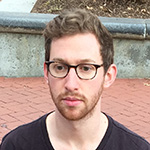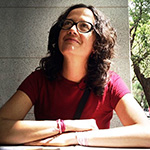from Formaldehyde
0
For abdominal pain, malaise, or social decay, for a white collar, cramps, corruption, place a pot of water in the anafre until it comes to a boil. Add a handful of rue, marjoram, sweet acacia. Let it stand (time is measured differently, not by saying five minutes, not like dropping in an alka-seltzer or some pepto-bismol) before bringing it back to a boil. Now, letting it stand once more, serve while the person, well covered, reclines.
It seeps in you,
the plant’s murmur penetrates you.
Like smoke it wisps into your body, ideas, indignation, reflection.
When they reach your navel the plants, the concoction, will say a prayer or give an order, and the unease, the non-conformity will leave you. They expel it, whatever there is inside you, they’ll rid you of it.
We’ve known this always.
I feel a crackling inside,
for a long while, agitating inside me, it won’t stop from boiling.
0
She stands and it’s a saber in the glare. Delivering a spring of blood there. Stabbing. A network of veins. Again it charges and. In her face, a constellation of reds. The droplets wipe clean as if painting a mask. Open and the teeth. Eyes wide. White and white form that gaze and it’s hatred. The strips of glass flinch between her fingers, with the neck it swells until the scream is a hole. And she stands with fear. Sweat, sweat in her pillows and in the viscous blackness. But then it smells, smells like her husband, smells like the same nightgown as always. She finds her glass of water and drinks. She drinks it all. She wants to cast off her hair but her clinging hairs are tendons adhering to her neck. Blindly she guesses her feet into her slippers. Mangled, she mutters on tiptoes, like bound feet. She passes through the hall and her steps are swallowed in its walls. It’s not only in the darkness that we fumble blindly. Febe comes to the study to get a feel for the living. The heart never, never the heart, not even when we’re distracted, stays asleep. She turns on the light: the jar, the opacity of saturated tow-gray taupe. She grabs a book from the shelf. She reads, delves in, gets lost in a children’s story that Larca never liked. Now she understands it, everything is elucidated alone.
0
Bird-watching
On this strange outing we’ve seen exotic plumage, strong shanks, their cunning eyes taking refuge in nests of hard earthen sticks, sculpted by dry feet. Beak sculptures of precious material, brilliant jade or coral, dying their necks when they eat it. Indifferent eyes fixed like the holes of masks. Binoculars fixed on eccentric worlds of birds flying in circles, of proud headdresses, warriors moving clumsily around their prey and dancing, the squawk from afar, drawing in on the snail. With their proud costume of feathers and stones, they fly in you, in this tunnel we wear from our eyes. Coming toward us, more present than ever, to eat snakes and grasses, what’s left of worms, or a museum’s data sheet. And in its elegant repose on the altar, we must see ourselves in its obsidian black. It picks at entrails, later to sing as if beckoning, the incomprehensible language, those songs, the distance we hear in our observation. Look, in their feathers the bright radiance of the water heralding markets and hatcheries. Look how strange it is, how it moves, how it prays, how it eats the little bit that it eats. And its hard skeleton. And its inner tension, ignoring you you know, snubbing you, that bird that’s very cruel, very cruel in its violence.
0
other worlds
(extraterrestrial question)
all of the time an all of the time seeing the sky
imagining imaginary beings
touched on the forehead accessories of war
strange technology unusual knowledge
extraordinary powers
(pre-Hispanic-spatial)
all of the time an all of the time seeing the sky
and with the passing of the years discovering, firmament,
that in the sky there is nothing
that in the sky there is nothing
0
We’re damned, Moctezuma, condemned to disappearing. Your world and mine are marked for extinction. In you it was intuition, in us certainty, in you a hunch by way of a comet, in us the sign that it’s melting. Your world was consumed by an unfamiliar culture, mine by a culture without rival.
From here the volcanoes without snow are frightening. They’re the sight of the brigs approaching the coasts of Veracruz. They’re the beginning of the end of an era, an epoch, a civilization. From the height of a glen someone sees the stains of boats spreading in the sea. We don’t know what that person thought. What would they have felt?
From here the volcanoes without snow are frightening. Something stops short like a gallop, like a tangle, like a cold arrogance beginning to thaw.
Translator’s Note:
Formol is the story of a family heirloom, a heart in a jar of formaldehyde. A metaphor for Mexico, the heart is often only a meeting place, a formal center out of which Faesler’s cross-genre exploration expands and contracts. The novel interweaves contemporary life and historical landscapes as it shifts between the poles of fiction and poetry. Themes of obsession and the diffusion of cultural history inform the story’s treatment of contemporary family life and adolescence. Our understanding of contemporary Mexico City cannot be separated from our understanding of Mexico’s historical past.
Formol is full of poems: prose poems, concrete poems, poems that resemble recipes or sets of instructions. These are not a departure from narrative. Rather, they often enact an interstitial space wherein thematic and narrative concerns meld, wherein voices converge or disappear.
The meeting of form and content in Faesler’s prose is perhaps best described as a pulsing, a contraction and expansion, a circulation that is both mimetic of the “human heart the size of a fist inside of a jar” and the productive overlap of the contemporary and the historical. I hope that the reader will occasionally feel the presence of the original text, not as something concrete but as a quiet “hidden pulse.”

Adam Greenberg is a recent graduate of Brown University’s MFA in poetry. His poems and translations have recently appeared or are forthcoming in Asymptote, Poor Claudia, Columbia Review, and Brooklyn Review, among others. Adam lives in Washington, DC and teaches writing at George Mason University in Virginia.

Carla Faesler’s poetry has often challenged genre descriptions, not only in the form of prose poetry but also as visual and conceptual art. She has written four books of poetry, Mixcóatl (1996), No tú sino la Piedra (1999), Anábasis maqueta (2003), and Catábasis Exvoto (2010), as well as the novel Formol (2014). She was awarded the Premio Nacional de Literatura Gilberto Owen for Anábasis maqueta. Carla Faesler was born in Mexico City, where she currently lives.
